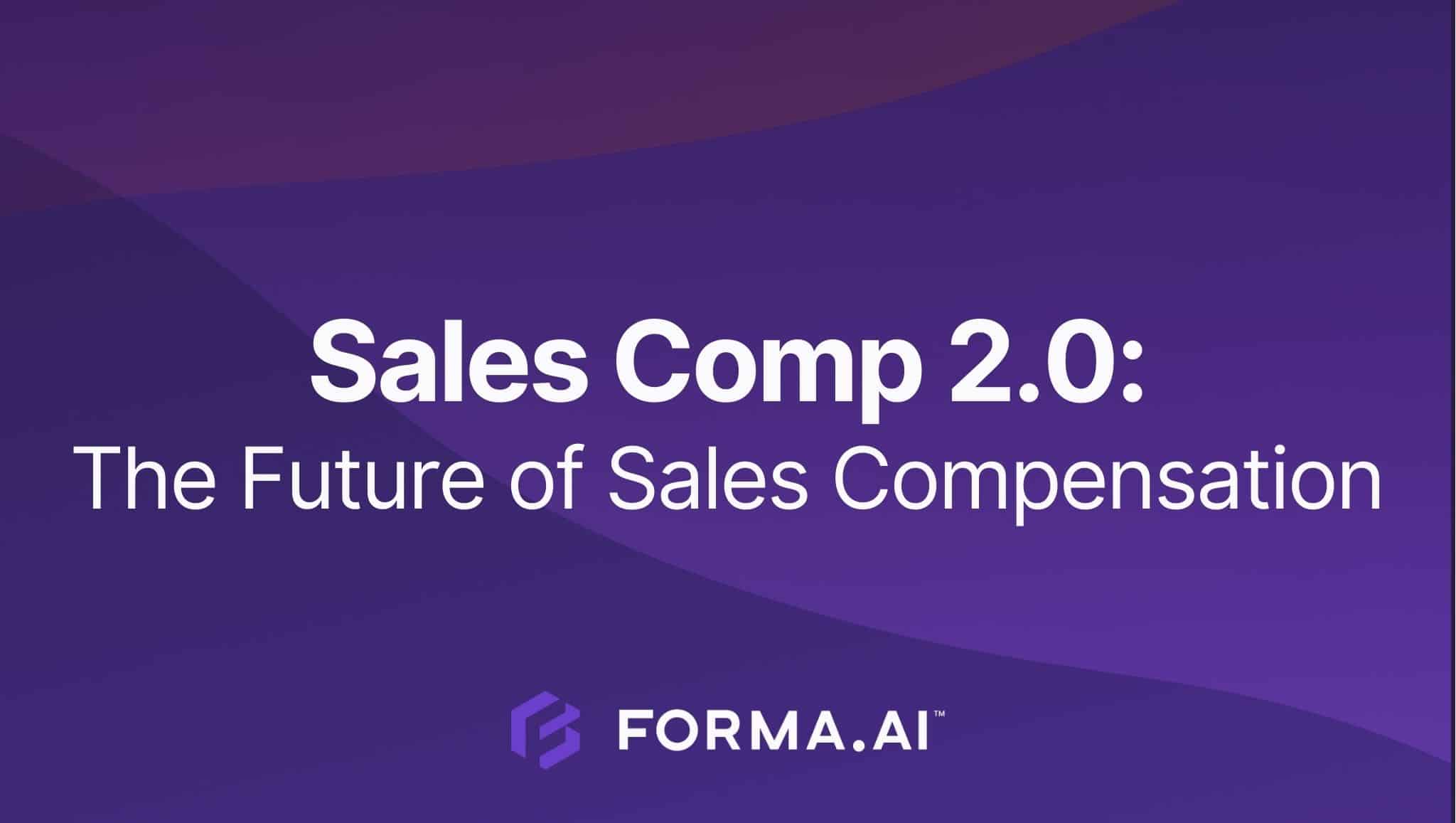Sales Comp 2.0: The Future of Sales Compensation

Technology has changed nearly everything about the way businesses operate over the past 50 years. But somehow, sales compensation tooling must have missed the memo.
We’re in the age of AI and self-driving cars, where tech increasingly automates more and more tasks, yet sales compensation technology is still limited to calculators in the cloud. While that’s a notable step up from spreadsheets in Excel, it still makes for highly manual and repetitive work that leaves us stuck in the past.
As a result, enterprise companies continue to struggle – over and over again – with the same sales comp problems they’ve struggled with for decades: too much time spent configuring formulas, cohesion lost to disjointed tools and stakeholders, and painfully slow plan rollouts due to the disconnect between strategy and execution.
In fact, many of our customers used to take an average of 6 months to change or update their comp plans (keywords: used to!).
Widespread digital transformation of sales compensation technology is long overdue.
Businesses need a fundamentally new approach to sales comp technology, one that automates manual labor and bridges the gap between sales comp strategy and execution. We need technology that finally leverages the tech advancements we’ve made in the past couple of decades – AI included. In fact, AI would be at the center.
The future of sales comp is one where:
- Sales comp strategy and execution are no longer disjointed
- Comp planning is done in days (not months) and deployed instantly
- Plans are optimized for maximizing output, even down to the individual rep
- The sales comp team focuses on behavioral engineering instead of building formulas
We call this new approach “CompOps,” a new category of sales comp software. However, you can think of it as Sales Comp 2.0, the next generation of sales compensation.
The world is ready for the future of sales comp, and the future of sales comp is here.
Current Sales Comp Tooling Can’t Keep Pace with the Dynamic Nature of Sales
Sales is anything but static, and as we’ve learned from the past few years, sales agility is more important than ever. When changes in the market happen (e.g., COVID-19, new product launches, customer targeting, you name it), companies need to adapt and shift sales’ focus rapidly.
The meaning behind being adaptable in your GTM strategy has changed, too. Once a helpful asset, agility is now paramount in order to face increased unpredictability.
Unfortunately, most sales compensation technologies make it nearly impossible for large enterprises to keep up. They are using on average 3 different tools and taking 6+ months to change and roll out comp plans (based on our observations of enterprise companies before using Forma.ai).
When the comp strategy needs updating, your disjointed tools, from planning through administration, don’t work together or streamline the functions necessary to adapt.
So, since sales compensation is still done the way it’s always been done, sales comp leaders face the same two hurdles blocking agility time and time again:
- Too much time is spent in the weeds managing calculation logic and formulas, preventing more strategic work and behavioral engineering
- Sales and go-to-market (GTM) agility are bottlenecked by disjointed processes across territory, quota, and comp strategy and execution
As a result, companies can’t mobilize sales teams at the pace they need to
Many sales comp consultants see these problems repeatedly (including former consultant and Forma.ai’s founder, Nabeil Alazzam), regardless of the sales comp tools they’re using. Changing from one software to another wouldn’t really change anything.
In reality, the way most technologies approach sales comp is fundamentally flawed. There’s a better way to do things.
The Future of Sales Compensation Management
In the future of sales comp, we hope to see companies maximizing every dollar spent on sales compensation.
Companies will be able to leverage internal and external data to optimize sales incentives for every single rep and adapt when needed instantaneously. Incentive plans will become more segmented and individualized to each seller based on the context of the dynamics around them.
There will be no more building plans from scratch in one system and implementing them in another. No more guessing as to how a comp plan will perform. And no more confusion from the sales team on how they are compensated.
Operational tasks will become simplified and automated, meaning sales comp practitioners will spend more time strategizing and optimizing to unlock the most value.
This is made possible with AI. The future of sales comp involves generative AI at its finest – not just a chatbot.
And there’s one critical requirement to harnessing the full potential of AI in the sales comp process:
A universal data model.
In a future-focused sales comp software, a machine learning model is trained on the aggregated data of thousands of companies. This means that as more comp plans are created, the model learns what works best in each unique scenario.
The implications of that are huge. AI could suggest relevant comp plans or incentives, predict which one will work the best for you, and then build and execute it for you with the push of a button.
At Forma.ai, we call this universal data model the “CompOps Engine.” It’s how we bring the new philosophy of “CompOps” to life.
What is CompOps?
CompOps, or compensation operations, is a new category of sales compensation software that automates sales comp operations by bringing design, testing, and execution together under one roof. It’s a new approach that holistically transforms sales comp as we know it.
Similar to RevOps and SalesOps, which facilitate revenue or sales operations by integrating technology and processes, CompOps facilitates the way sales comp operates by integrating and streamlining the processes behind sales comp.
In most businesses, sales comp plans are built, tested, and executed in silos, making the operations of sales comp disjointed and slow. This separation causes the biggest inefficiencies for sales comp leaders, whether they realize it or not. Most of their time is spent on operations, and not enough time is spent on strategic planning.
By acting as a bridge between design and execution, CompOps eliminates silos across functions and departments to enable true sales agility. It leverages AI and predictive analytics to bring automation into sales comp at every step. At Forma.ai, this is possible with the universal data model, the CompOps Engine.
There were two main problems we mentioned earlier that all sales comp practitioners face. Let’s revisit those problems and see how a CompOps software could provide a solution.
Problem #1: Too much time is spent managing calculation logic and formulas.
Solution: The CompOps Engine lets you automate formula configuration so you can do more with less. You can define territory, quota, and comp plan structure parameters in plain English, then sit back while the platform configures the rules. This helps dramatically reduce the time to perform much of the change-related sales comp tasks. For example:
- Designing and building out new comp plans for the next fiscal year
- Streamlining period-end exceptions and adjustments
- Adjusting quotas or territories mid-year as needed
With so much time saved by automating complex operations, you can focus on what matters most:
- Overseeing the comp process at a high level and identifying areas for process improvement and further efficiency
- Ensuring reps are adopting/understanding the plan
- Identifying inefficiencies in change management/stakeholder alignment
- Trying to capture growth opportunities through incentives proactively
Altogether, you’ll spend more time designing the right strategic incentives to properly motivate your sales team so that your organization can reach its revenue goals.
Problem #2: Sales and GTM agility are bottlenecked by disjointed processes across territory, quota, and comp strategy and execution.
Solution: CompOps eliminates the need for separate systems for sales performance management (SPM) design, testing, and execution. Too often, organizations have separate teams, tools, and processes across the end-to-end sales comp planning and execution processes. Now, all of these functions and stakeholders can work together in one CompOps platform to execute the GTM strategy much faster.
By integrating these processes and unifying the data, your teams can:
- Immediately see the impact at an organization level and individual rep level when comp plans, territories, or quotas are changed
- Capture more revenue opportunities by optimizing GTM levers across territories, quotas, and sales comp
- Rapidly design and test different scenarios, then deploy them instantly to capture more revenue opportunities, faster
Additionally, each sales comp stakeholder can easily access what they need to and work seamlessly together:
- Finance and RevOps teams have a place to model financial outcomes for any SPM lever so they can more accurately forecast spend and revenue
- HR teams have a place to determine accurate payouts and provide clear pay transparency, reducing the time spent handling disputes from the sales team
- Sales team members have a place to easily understand their individual comp plan, with customized dashboards that inspire and motivate the most important behaviors at the right time
Without these silos between departments and functions, every team can work cohesively toward a more strategic comp plan, learning from each other along the way.
If your sales comp operations need a revival, CompOps is the solution. And thankfully, the future isn’t far. In fact, it’s here now. Many organizations are already leveraging CompOps to transform their operations in Forma.ai.
The Future of Sales Comp Is Already Here
Forma.ai is the ultimate CompOps platform for the enterprise.
If you’ve experienced the pains of outdated sales comp software, it’s time for a new approach. We’ve been helping enterprise organizations overcome these obstacles since day 1. CompOps is a new term, but it’s been in action for years now.
Here’s what CompOps looks like in the Forma.ai platform:
Build
Define your business objectives in plain English and feed them into our data model, which takes complex rule-building and formula management out of your hands. Or use customizable templates to organize and elevate any sales comp program, especially at the enterprise level.
Test
Simulate your plans against real data and logic. With our performance and financial modeling capabilities you’ll understand the true impact of your plans at the organizational and behavioral (rep) level. Forma.ai connects each stakeholder to the plans and changes pending release so that your organization stays in sync and releases become continuous.
Run
Forma.ai’s end-to-end workflow, calculation engine, and enterprise-grade computing help automate and streamline incentive comp management (ICM) and ensure every stakeholder is on the same page. From payroll calculations, pay disputes, monthly accruals, performance reporting, or designing and approving new plans for the year, Forma.ai helps you do more at scale.
Some of our customers say it’s a “Godsend,” others simply say they love it. Check out our 5-star reviews.
We’re on the brink of changing sales comp as we know it. Are you ready for the future of sales comp? Book a demo to experience it for yourself.




